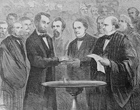Union victory in the war resolved two festering issues that had been left unresolved by the Revolution of 1776 and the Constitution of 1787 that gave birth to the United States. The first was the nagging question whether this fragile republic, this precarious new democracy, would survive in a world bestrode by monarchs, czars, tyrants, and aristocrats. Americans were painfully aware that most republics through history had collapsed into anarchy or tyranny or had been overthrown by foreign invaders. Some Americans alive in 1860 had seen two French republics rise and fall. Latin American republics seemed to succumb regularly to dictators, military rulers, or anarchy. The hopes for the birth of democratic government in Europe during the revolutions of 1848 had been dashed by counterrevolutions that entrenched the Old Order of monarchy and aristocracy. Could the United States endure as one nation, indivisible, with a government based on majority rule? The secession of eleven states in 1861 represented the greatest challenge to survival. The nation met that challenge and prevailed in 1865. Since then no state has seriously and substantively (as opposed to rhetorically) threatened to secede.
Americans in the first half of the 19th century liked to boast of their country as "the land of liberty, a beacon of freedom to the oppressed of other lands." But by midcentury the United States had become the largest slaveholding country in the world. Lincoln took note of this paradox in 1854. "The monstrous injustice of slavery," he said in a speech at Peoria, "deprives our republican example of its just influence in the world--enables the enemies of free institutions, with plausibility, to taunt us as hypocrites." With the abolition of slavery by the Civil War, embodied in the Thirteenth Amendment to the Constitution in 1865, that particular monstrous injustice and hypocrisy existed no more.
The abolition of slavery, however, did not end racism, discrimination, and caste segregation of which slavery had been the most extreme manifestation. The Fourteenth and Fifteenth Amendments, adopted in 1868 and 1870, implanted equal civil and political rights in the Constitution. But for generations the nation failed to live up the promises of these Amendments. The issue of racial justice that came to the fore in the Civil War era is still with us today.



